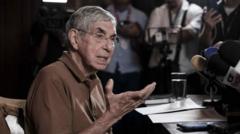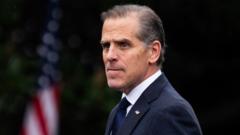The US State Department has canceled the visa of Oscar Arias, a Nobel Peace Prize-winning former Costa Rican president, shortly after he publicly criticized Donald Trump's behavior. Arias suggests his ties to China during his presidency may have influenced the decision, which he believes was made by the State Department rather than Trump himself.
US Revokes Visa of Nobel Peace Prize Winner Oscar Arias After Trump Criticism

US Revokes Visa of Nobel Peace Prize Winner Oscar Arias After Trump Criticism
Oscar Arias, former president of Costa Rica and Nobel laureate, announces his US visa has been revoked following comments critical of Donald Trump.
Former Costa Rican president Oscar Arias has publicly declared that his US visa has been revoked. The 84-year-old Nobel laureate made this announcement during a news conference held in San José, revealing the cancellation occurred weeks after he criticized Donald Trump, likening the president's behavior to that of a Roman emperor.
Arias, recognized for his pivotal role in ending conflicts in Central America, conveyed his bewilderment over the decision, stating that he received a brief and vague email from the US government without any clear justification. While he refrained from speculating too much, he pointed to his establishment of diplomatic relations with China during his presidency from 2006 to 2010 as a potential reason for his visa revocation.
In his comments, Arias underscored the significance of his 2007 decision to sever diplomatic ties with Taiwan in favor of China, a move that has garnered global attention. The Trump administration has frequently criticized various Central American nations for their cooperation with Chinese interests, tightening its stance against Chinese influence in the region.
While the current Costa Rican government, led by President Rodrigo Chaves, enjoys a favorable relationship with the US—evidenced by Chaves' exclusion of Chinese firms from Costa Rica’s 5G development—Arias has expressed concern over this dynamic. In a social media post earlier this year, he stated that "it has never been easy for a small country to disagree with the US government," reflecting his belief in maintaining autonomy in international relations.
Notably, Arias is not alone in having faced visa revocation; three members of Costa Rica’s national assembly who opposed government measures limiting Chinese participation in telecom development have also lost their visas, highlighting a growing trend of punitive actions against critics of the current administration's foreign policy.



















